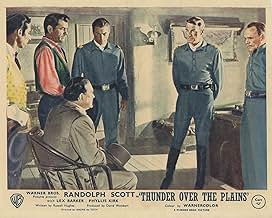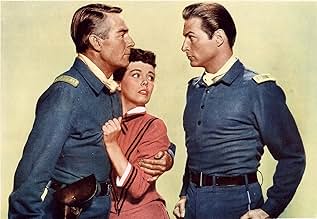En la Texas posterior a la guerra, un capitán del ejército trata de mantener la paz entre los granjeros empobrecidos y agobiados por los impuestos y los codiciosos usureros.En la Texas posterior a la guerra, un capitán del ejército trata de mantener la paz entre los granjeros empobrecidos y agobiados por los impuestos y los codiciosos usureros.En la Texas posterior a la guerra, un capitán del ejército trata de mantener la paz entre los granjeros empobrecidos y agobiados por los impuestos y los codiciosos usureros.
- Dirección
- Guionista
- Elenco
- Hodges' Sergeant
- (sin créditos)
- Texan
- (sin créditos)
- Walter Morgan
- (sin créditos)
- Trooper
- (sin créditos)
- Texan
- (sin créditos)
- Kehoe
- (sin créditos)
- Dirección
- Guionista
- Todo el elenco y el equipo
- Producción, taquilla y más en IMDbPro
Opiniones destacadas
First, there's an intelligent script by Russell Hughes, who wrote for some good radio shows like "Nightbeat" and Alan Ladd's "Box 13", as well as such films as Anthony Mann's "Last Frontier", Delmer Daves' "Jubal", and even the best of the giant-bug movies, "Them".
Then, there's the look and feel of the film. Director Andre De Toth and his great cinematographer Bert Glennon (who had done remarkable work with the likes of Josef von Sternberg and John Ford) light and shoot for realism and emotional impact. Glennon had also shot "Man Behind the Gun" (available on the flip side of this DVD), so I suppose director Felix Feist could be blamed for that film's phony-looking stage sets. Here, in "Thunder... ", a barroom scene looks like it was shot in a real barroom (foreshadowing Clint Eastwood's "natural lighting" technique by decades) and exteriors are shot outdoors. To be fair, the Feist film may have had budget or producer issues, but given that film's potential (dealing with water rights, corrupt politicians, the possible secession of southern California, even the semi-legendary Joaquin Murrietta as a supporting character) it still seems like a typical, entertaining, 40's-style B-movie. "Thunder...", released the same year, 1953, seems more forward-looking, more compelling, more of the age of the "adult" Westerns, even though the literally flag-waving ending with its narrative paean to the great state of Texas kind of pulls us back to B-movie-land.
Thunder Over The Plains sags just a bit in the middle, but has great production values and is fairly ambitious for a 1950's B-western, with some pretty complex characters. The cinematography and direction by Andre De Toth are excellent.
Elisha Cooke Jr. is pretty good as a sniveling tax collector. Lex Barker's character is especially vile, kind of a surprise considering the times in which this was made and the fact that Barker is so handsome and all-American looking!
Tale set in post Civil War Texas where carpetbaggers ruled almost supreme, and the occupying Federal troops seemed to let them. There's a gang of patriotic outlaws led by a Robin Hood character trying to redress the balance and a complicated set of sympathies and antagonisms with which to contend. And Lex Barker was playing a nutter. But if I correctly remember my extensive Frank Yerby reading when I was a kid surely in reality the Ku Klux Klan couldn't have been far away in matters of this kind in their role of Southern saviours? There's time in this shortish formula fiction film for lots of plot twists, cold business, love, jealousy, rage, backstabbings, murders galore, some honour and integrity, all of it delivered with plenty of panache, a nice colour and sporadically excellent camera-work.
It's enjoyable hokum up to a point but ultimately loses its way because there's no one you can really root for but many you can root against. Naturally, Scott is as dependable as usual.
It's 1869, and Texas is still not part of the Union. Carpetbaggers rule the state and criminal activity is high. Captain Porter (Scott), a proud Texan himself, finds he has to carry out orders against his own countrymen. When a man in town is murdered in cold blood, suspicion falls on rogue cowboy Ben Westman (McGraw), but Porter believes he's innocent and strikes a deal to bring him in for a fair trial. However, this sets off a chain of events that leads to Porter himself becoming a wanted man.
Knowing direction, fine acting and a darn good script, all make Thunder Over The Plains essential viewing for the 50s Western fan. The bonus, aside from the impressive support cast, is the story itself. This was a troubled time, a time when only two states were not yet accepted back into the Union post the Civil War. Toth and Hughes paint a murky town, one of corruption, tax oppression and shifty shenanigans. There's even room in the story for strains on the family home of Porter and an attempt at adultery. Throw in the nice colour and scenery, pace it briskly with enjoyable action set-pieces (the shoot out at the end is familiar but excellently done), and it's a fictionalised winner. 7/10
The rivalry between the two captains, Scott and Barker, is an interesting feature, especially when it extends to Scott's wife (Kirk). That scene where the home-sick wife is captivated by the handsome Barker is both well played and unusual for a western. Note too how Scott is compelled by the byplay to fade into the background, another unusual feature for a western hero.
Though filmed just west of LA, the rolling scenery makes a good Technicolor backdrop to the action. Much credit for making the elements work should go to director de Toth who was skilled at handling conflict as shown in his masterwork, Ramrod (1947). The redoubtable Sam Peckinpah also selected de Toth to direct many episodes of his groundbreaking TV series The Westerner (1960).
On the whole, it's a complicated story of personal and political conflict but still delivers the goods for fans of westerns.
¿Sabías que…?
- ErroresGrowing cotton and transporting cotton bales thru the hilly countryside was a foolish director's scheme. In 1869 cotton wasn't grown within 1,000 miles of this area.
- Citas
Norah Porter: Whatever became of Frances Bilky?
Captain Bill Hodges: I don't know. She married a colonel, I think. Maybe it was a general. At any rate, she outranks all of us.
Norah Porter: But that's wonderful! Now she'll have her lifelong ambition to lead the cotillion. Well, I guess that's what I always wanted too.
Captain Bill Hodges: You don't have anything like that around here, do you, Captain?
Captain David Porter: Oh, I don't know. The Indians come down once a month and dance for us.
- ConexionesReferenced in Asalto a Las Vegas (1968)
Selecciones populares
- How long is Thunder Over the Plains?Con tecnología de Alexa
Detalles
- Tiempo de ejecución
- 1h 22min(82 min)
- Relación de aspecto
- 1.37 : 1



















